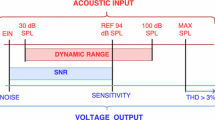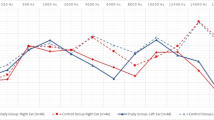Abstract
A preliminary design is presented of a prototype for a novel rehabilitative device for hearing preservation through auditory threshold adjusted feedback & control, combining the benefits of emerging technologies of ABR OAE and microcomputer based expert system. There are some audio devices available in the market that can be set to limit the sound output to a lower volume. These devices are not intelligent enough to adapt to physiological responses of individual listeners automatically. The proposed design utilizes the concept of temporary threshold shift to alert the user of unsafe listening conditions. The temporary threshold shift is estimated via conventional psychophysics or electrophysiology, such as ABR or OAE type of monitoring depending on user choice or convenience. Unlike industrial noise dosimeters, the proposed device may be applicable for private home use, especially by music lovers who are at risk of premature hearing damage due to self administered excessively loud and prolonged listening conditions. Basically, it is intended to help individuals manage their own listening condition via continuous monitoring and feedback. As the listener listens to her favorite music, the onboard microcomputer utilizes the ongoing music output itself as the stimulant and monitors various psychophysical or electrophysiological responses via an expert system type analysis to estimate whether the listener is exceeding safe listening conditions. The device features highly compact portability for harsh environments, as may arise in the hands of young users. Two approaches are discussed: one based on microcontrollers and the other based on FPGAs. The simplicity of the user interface ensures that ordinary consumers would be able to use the device with minimal training or practice. The design is currently at conceptual level only. Further evaluations, especially sensitivity, specificity and safety aspects, are needed before actual application.
Access this chapter
Tax calculation will be finalised at checkout
Purchases are for personal use only
Preview
Unable to display preview. Download preview PDF.
Similar content being viewed by others
Author information
Authors and Affiliations
Editor information
Editors and Affiliations
Rights and permissions
Copyright information
© 2009 Springer-Verlag Berlin Heidelberg
About this paper
Cite this paper
Biswas, A., MacDonald, E. (2009). Design of a Prototype for a Novel Rehabilitative Device for Hearing Preservation through Feedback and Control. In: McGoron, A.J., Li, CZ., Lin, WC. (eds) 25th Southern Biomedical Engineering Conference 2009, 15 – 17 May 2009, Miami, Florida, USA. IFMBE Proceedings, vol 24. Springer, Berlin, Heidelberg. https://doi.org/10.1007/978-3-642-01697-4_119
Download citation
DOI: https://doi.org/10.1007/978-3-642-01697-4_119
Publisher Name: Springer, Berlin, Heidelberg
Print ISBN: 978-3-642-01696-7
Online ISBN: 978-3-642-01697-4
eBook Packages: EngineeringEngineering (R0)




